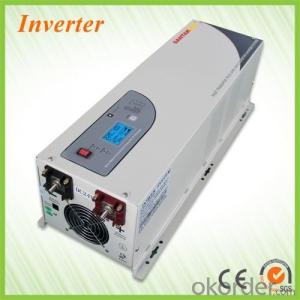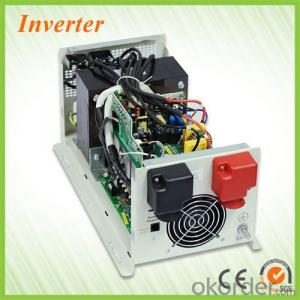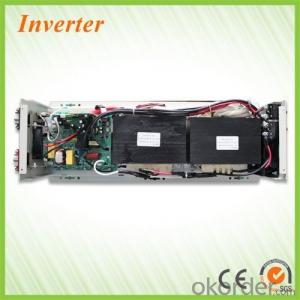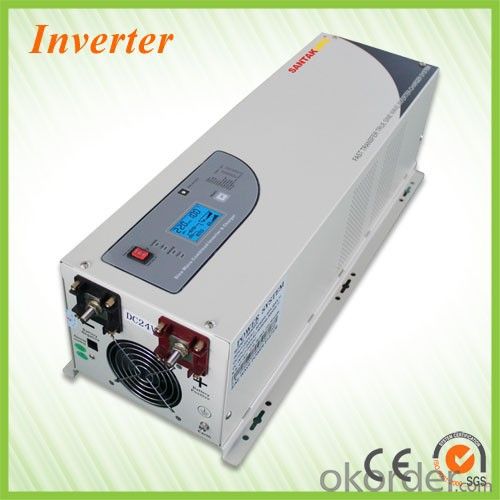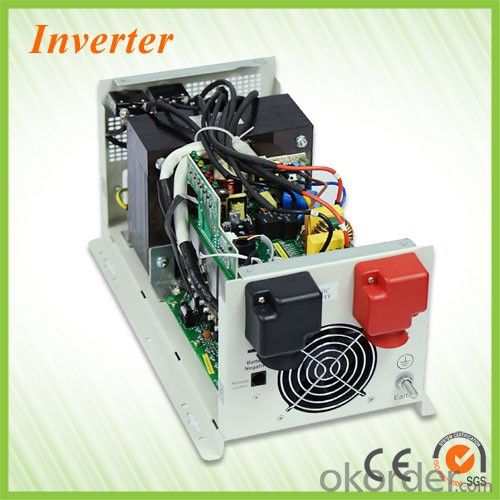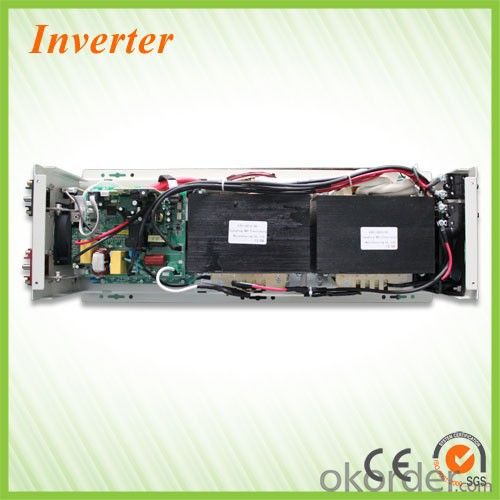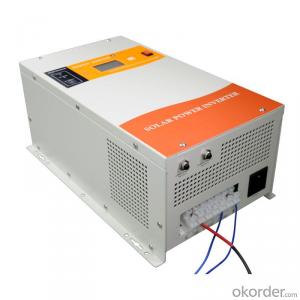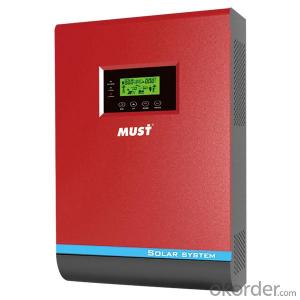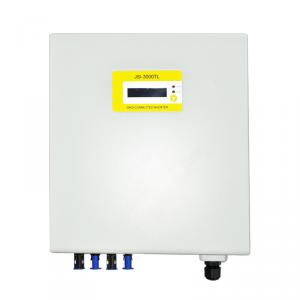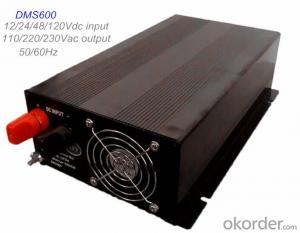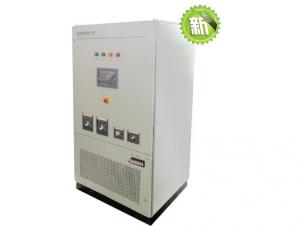2000W Solar Inverter - 2024 Top Selling South Africa EP 3000 48V 6000W Solar Charger Inverter
- Loading Port:
- Ningbo
- Payment Terms:
- TT OR LC
- Min Order Qty:
- 500 pc
- Supply Capability:
- 10000 pc/month
OKorder Service Pledge
OKorder Financial Service
You Might Also Like
2015 Top Selling South Africa EP 3000 48V 6000W Solar Charger Inverter
Features of EP3000 Series 48V 6000W Solar Charger Inverter :
High efficiency over 90%
12Vac/24Vac/48Vac
Max.charge current 70A
Inbuilt pure copper transformer
Automatic three-stage battery Charger
RS232 with free CD(option)
Solar first function(option)
Charge current adjustable(option)
Remote control(option)
CE certificate, Soncap certificate.
Product Picts of EP3000 Series 48V 6000W Solar Charger Inverter :
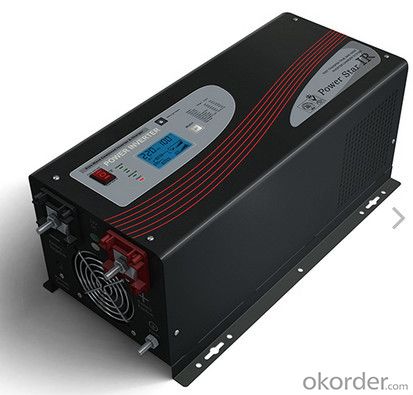
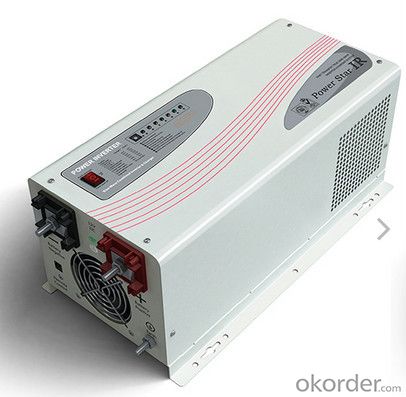
| Rated Capacity | 1000W | 1500W | 2000W | 3000W |
| Efficiency | >90% | |||
| Input | ||||
| Model | 120v Models | 230v Models | ||
| Nominal Voltage | 100V/110V/115V/120V Selectable | 200V/220V/230V/240V Selectable | ||
| Output | ||||
| Rated Power | 1000W | 1500W | 2000W | 3000W |
| Output Voltage | 100V/110V/115V/120V Selectable | 200V/220V/230V/240V Selectable | ||
| Voltage Waveform | Pure Sine Wave | |||
| Crest Factor | 3:1 | |||
| Regulation(Nominal) | ±10% Typical Of Nominal Voltage | |||
| Transfer Time | Transfer Time : AC To DC : 10ms (Typical) Transfer Time : DC To AC : 10ms(Typical ) | |||
| Max Bypass Overload Current | 30A | |||
| Input | ||||
| Nominal Voltage | DC12V/24V | DC12V/24V | DC12V/24V | DC24V/48V |
| Over Current Protection | By Re-Settable Over Current Protector | |||
| Output | ||||
| Nominal Input Voltage | 230Vac | |||
| Input Voltage Range | 185~265Vac | |||
| Nominal Charge Current | 35amp-70amp | |||
| Charger Short Circuit Protection | Circuit Breaker | |||
| Over Charge Protection | Bat. V ≥ 15.7Vdc/31.4Vdc/62.8Vdc Beeps 0.5s Every 1s & Fault After 60s | |||
| Battery Type | Lead-Acid 12Ah ~ 250Ah | |||
| Typical Backup Time | No Limit, Depend on external battery | |||
| Average Charging Current | 35A/20A | 45A/30A | 65A/35A | 75A/30A |
| Battery voltage Option | ||||
| Options 7 | Battery low trip to bypass 11v , high trip to battery 14v | |||
| Options 8 | Battery low trip to bypass 10.5v , high trip to battery 13.5v | |||
| Options 9 | Battery low trip to bypass 10v , high trip to battery 13v | |||
| Communications & Management | ||||
| Control Panel | LCD/LED Option | |||
| Audible Alarm | Alarm On Battery:Low Battery & Battery Over Voltage Alarm On Abnormal Operation: Over Load, Short-Circuit, & Over Heat | |||
| Environment and Safe | ||||
| Operating Temperature | 0℃ To 40℃ (32℉ To 104℉) | |||
| Transit/Storage Temperature | -15℃ To 60℃ | |||
| Audible Noise | 60 Dba Max at 1m | |||
| Quality Control System | ISO 9001,CE,FCC | |||
| Physical | ||||
| Dimensions: (H×D×W) | 570*320*315mm | |||
| G.W (Kg) | 19 | 19 | 22.5 | 27.5 |
| Packing | Export Carton For Each Unit Per Carton | |||
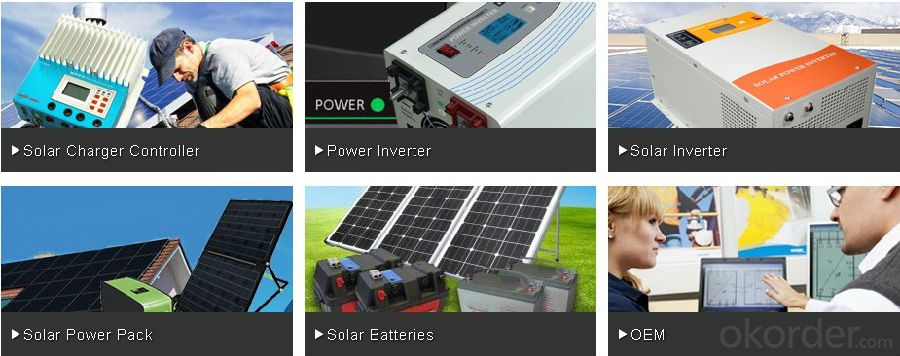
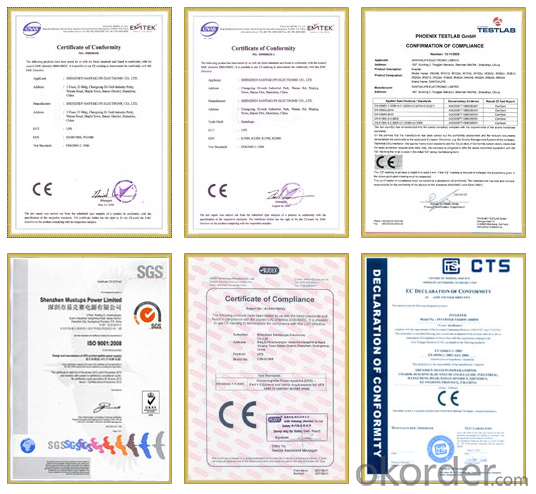
Warrenty
provides a 1~3 year limited warranty (“Warranty”) against defects in materials and workmanship for its Uninterruptible power supply, Power inverter/chargers, Solar charge controllers, Battery Products (“Product”).
The term of this Warranty begins on the Product(s) initial purchase date, or the date of receipt of the Product(s) by the end user, whichever is later. This must be indicated on the invoice, bill of sale, and/or warranty registration card submitted to MUST-Solar. This Warranty applies to the original MUST-Solar Product purchaser, and is transferable only if the Product remains installed in the original use location.
FAQ
1. How do I decide which system is right for me ?
For protection from long outages, include a generator or solar panels in your Must solar system. Shorter outages can be handled by a battery-only system.
2. Where my system will be installed ?
Must solar systems are usually wall-mounted near a home's main electrical (circuit breaker) panel.
3. How do I install my system ?
A must solar backup inverter is connected to a home electric system , we will supply detailed installation manual and videos for our customers .
4. How fast will my system respond to a power outage ?
Must solar inverters typically transfer to battery power in less than 16 milliseconds (less than 1/50th of a second).
- Q: Can a solar inverter be used in a ground-mounted solar tracking system?
- Yes, a solar inverter can be used in a ground-mounted solar tracking system. The solar inverter is responsible for converting the direct current (DC) generated by the solar panels into alternating current (AC) that can be used to power electrical devices or be fed back into the grid. Whether the solar panels are fixed or mounted on a tracking system, the inverter's function remains the same.
- Q: After the PV inverter, how to achieve the same period before the network?
- It can automatically detect the generator and the grid frequency and voltage, in the frequency, voltage, phase are in line with the requirements of the grid to set the time before the release of the closing signal, so that it can be safely and securely connected.
- Q: What are the potential risks of overheating a solar inverter?
- The potential risks of overheating a solar inverter include reduced efficiency and performance, increased wear and tear on components, shortened lifespan of the inverter, potential damage to internal circuitry, and even the risk of fire.
- Q: What is the role of a maximum power point tracker (MPPT) in a solar inverter?
- In a solar inverter, the maximum power point tracker (MPPT) plays a crucial role in optimizing the efficiency and power output of the solar panel system. Since solar panels generate direct current (DC) electricity while most appliances and the electrical grid operate on alternating current (AC), the MPPT continuously adjusts the operating conditions of the solar panels to extract the maximum power available from sunlight. The MPPT tracks the maximum power point (MPP) at which the solar panels can efficiently generate the most electricity. This is vital because the output of a solar panel depends significantly on factors like temperature, shading, and the angle of the sun. To ensure maximum power output, the MPPT continuously monitors and adjusts the voltage and current of the solar panel system, keeping it at the MPP. It achieves this by dynamically altering the electrical load on the solar panels to find the optimal operating point. Additionally, the MPPT acts as a converter, transforming the DC power generated by the solar panels into the AC power required for appliances or for feeding back into the electrical grid. This conversion process involves adjusting the voltage and frequency of the electricity to match the requirements of the appliances or the grid. In summary, the primary function of a maximum power point tracker in a solar inverter is to optimize the efficiency and power output of the solar panel system, ensuring the extraction of the maximum amount of energy from sunlight and its effective utilization for various applications.
- Q: What is the role of a solar inverter in a solar-powered electric vehicle charging station?
- The role of a solar inverter in a solar-powered electric vehicle charging station is to convert the direct current (DC) generated by the solar panels into alternating current (AC) that can be used to charge electric vehicles. The inverter ensures that the electricity produced by the solar panels is compatible with the charging station and the electric vehicles, allowing for efficient and safe charging.
- Q: What is the maximum DC input current for a solar inverter?
- The maximum DC input current for a solar inverter will depend on the specific model and specifications of the inverter being used. It is important to refer to the manufacturer's documentation or consult the product's technical specifications to determine the maximum DC input current for a particular solar inverter.
- Q: What is the lifespan of the warranty on a solar inverter?
- The lifespan of a warranty on a solar inverter can vary depending on the manufacturer and model. Generally, most warranties for solar inverters range from 5 to 10 years.
- Q: What is the role of a solar inverter in a solar panel system?
- The role of a solar inverter in a solar panel system is to convert the direct current (DC) electricity generated by the solar panels into alternating current (AC) electricity that can be used to power common household appliances and be fed into the electrical grid. The inverter also ensures that the solar panels operate at their maximum efficiency by tracking the maximum power point to optimize energy production.
- Q: What is the role of fault ride-through capability in a solar inverter?
- The role of fault ride-through capability in a solar inverter is to ensure the uninterrupted operation of the inverter during grid faults or disturbances. It allows the inverter to remain connected to the grid and continue generating power, even in the presence of temporary voltage dips or interruptions. This capability is essential for grid stability and reliability, as it helps prevent power outages and disruptions in the event of faults in the grid.
- Q: What is the maximum output voltage of a solar inverter?
- The maximum output voltage of a solar inverter depends on various factors such as the inverter model, design, and specifications. However, in general, the maximum output voltage of a solar inverter is typically around 230-240 volts for residential or commercial applications.
Send your message to us
2000W Solar Inverter - 2024 Top Selling South Africa EP 3000 48V 6000W Solar Charger Inverter
- Loading Port:
- Ningbo
- Payment Terms:
- TT OR LC
- Min Order Qty:
- 500 pc
- Supply Capability:
- 10000 pc/month
OKorder Service Pledge
OKorder Financial Service
Similar products
Hot products
Hot Searches
Related keywords
